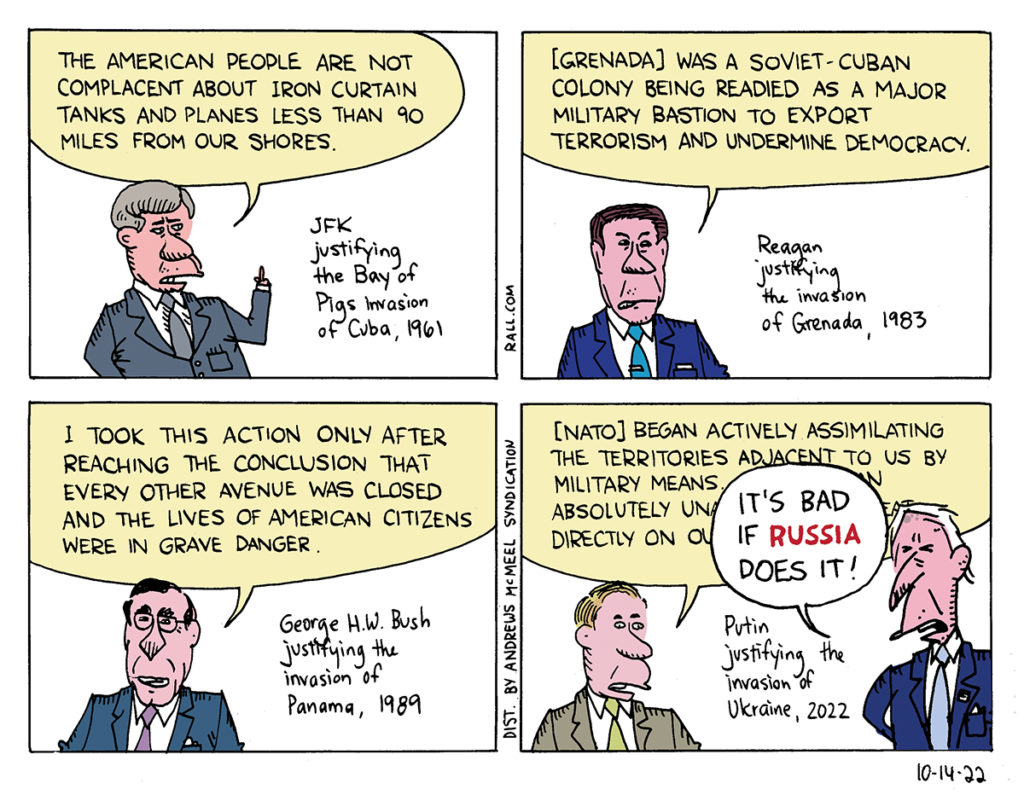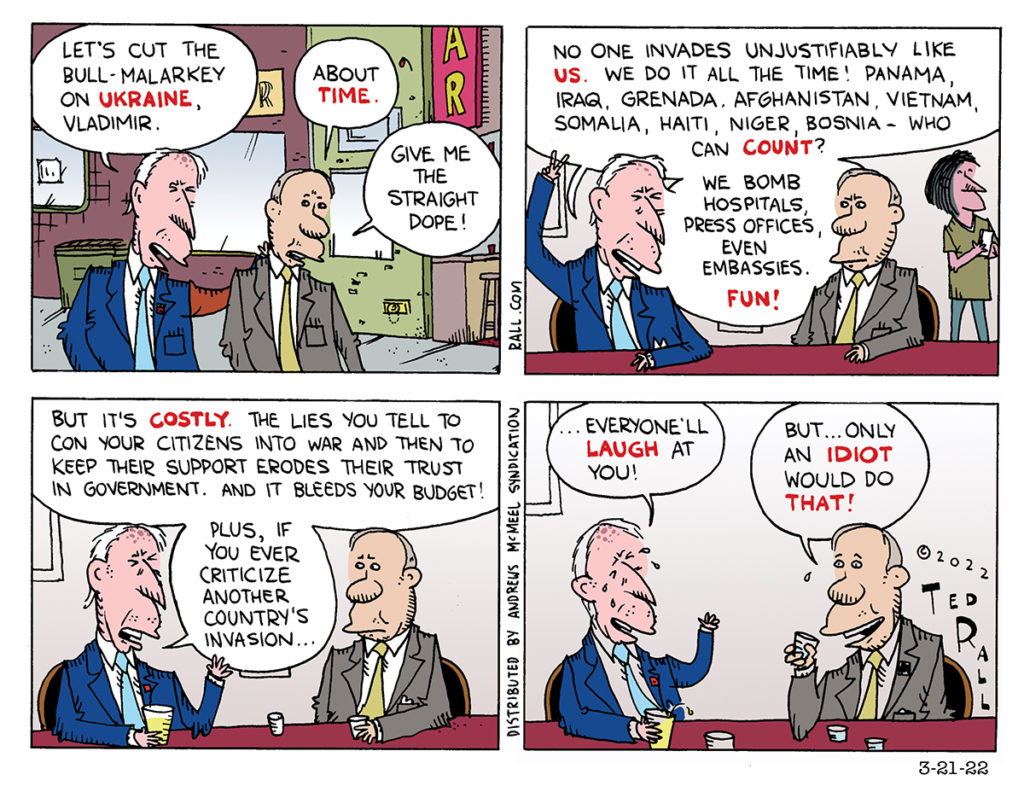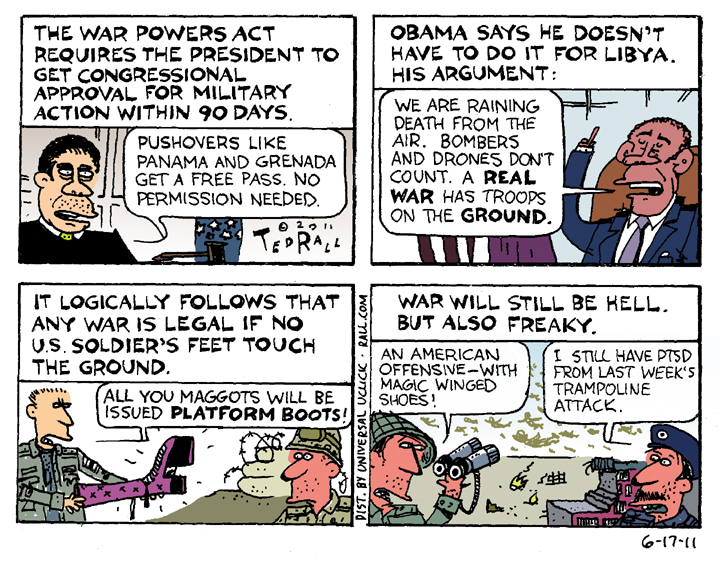From the Monroe Doctrine to the ongoing blockade of Cuba, the United States has repeatedly exerted and exercised its prerogative to invade any country in its immediate region, up to and including the entire Western hemisphere, if it perceives a threat of any kind, whether real or imagined. So it’s a bit baffling that so many Americans violently deplore Russia’s invasion of Ukraine, which is right along its border, after Ukraine threatened to join NATO, an anti-Russian military alliance.
Ukraine War Lies Debunked
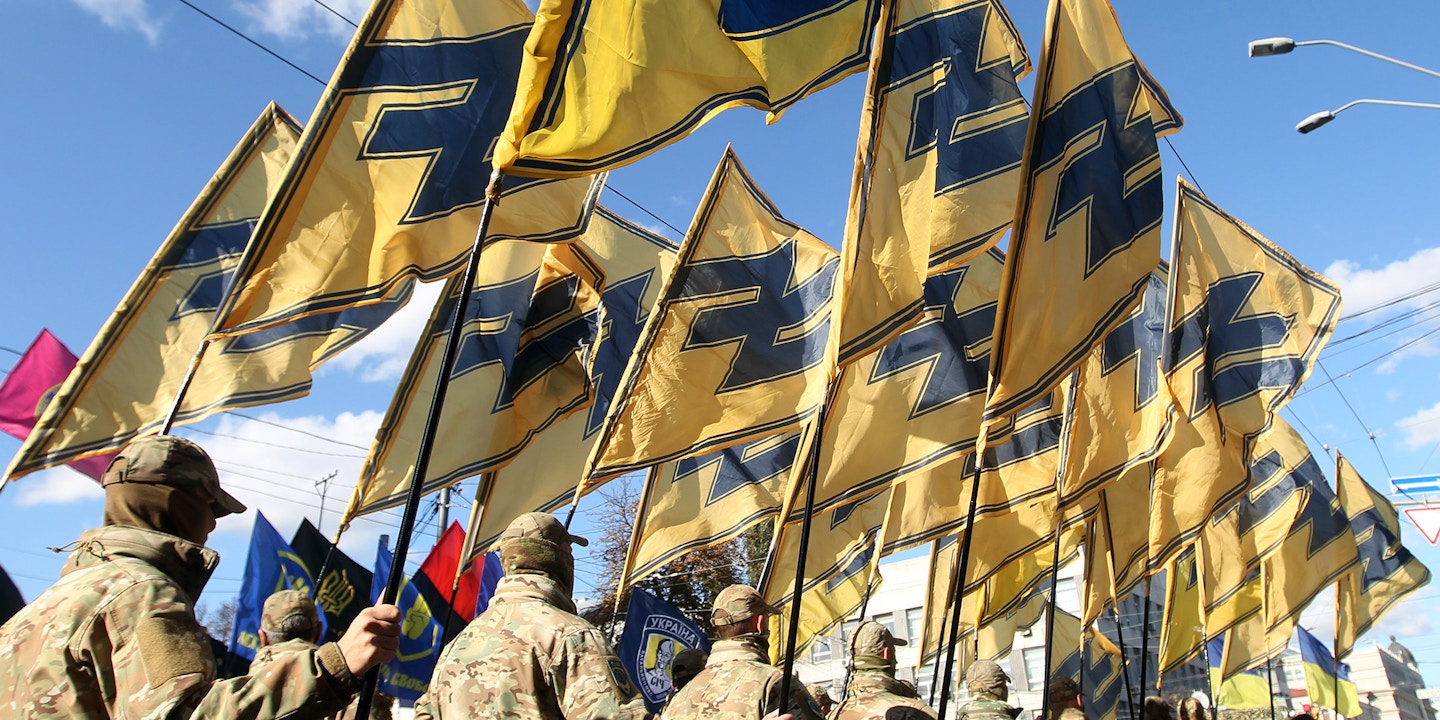
Even the wars that historians judge to have been noble and beneficial rely on popular support marketed and sustained by lies. Contrary to what the English government told its people during World War I, German soldiers didn’t bayonet Belgian babies in their cribs. The “cocaine” U.S. troops claimed to have found in Panamanian dictator Manuel Noriega’s home was nothing of the sort. The Taliban offered to turn over Osama bin Laden – it was George W. Bush who refused to take him, because to accept would have denied him his excuse to invade Afghanistan.
As General and Director of British Military Intelligence John Charteris observed after World War I, “to make armies go on killing one another it is necessary to invent lies about the enemy.”
America’s incipient proxy war against Russia over Ukraine is no exception to the rule. BS has been flying fast and furious as media outlets dutifully align behind the U.S. government war machine and the array of defense contractors that influence it. As usual, their purpose is clear: spook the American people into supporting a war in a country they hardly know anything about, take the side of a highly problematic regime and create a world of death and destruction for the benefit of greedy warmongers before the rubes/voters figure out they’ve been conned.
Let’s take a look at some of the biggest lies being used to garner and prop up support for the Ukrainian government of President Volodymyr Zelensky:
Lie #1: Ukraine is a democracy.
Zelensky won the presidency in a fair election in 2019. But context is critical. The 2019 election was held in the immediate aftermath of a brutal coup d’état. In 2014 a violent mob comprising neo-Nazi extremist groups like the Azov Battalion and Right Sector, and covertly supported by the Obama Administration, forced President Viktor Yanukovych, democratically-elected and pro-Russian, to flee for his life.
The new revolutionary government held an election in 2014, which Petro Poroshenko won. Zelensky is Ukraine’s second post-coup ruler.
Here’s an analogy for Americans: instead of failing, Trump’s January 6th coup succeeds. Biden flees to Canada and, even though he lost, Trump serves a second term. Trump endorses Mike Pence in 2024. Pence wins that election. Is Pence a legitimate president? Is America a democracy?
Democrats would answer no.. As do the 49% of Ukrainians, including many ethnic Russians, who voted for Yanukovych. They feel the same way about Zelensky, that he’s not legitimate. Which is why ethnic-Russian areas in the eastern Donbas region, Donetsk and Luhansk, declared independence and broke away from Ukraine after the 2014 coup, and ethnic-Russian Crimeans greeted Russian forces when they annexed the peninsula.
To half its people, Ukraine doesn’t feel like a democracy.
Lie #2: Ukraine is a free society.
Ukraine is an authoritarian state with a veneer of democracy. Zelensky recently signed a decree ordering that all TV broadcasters in the country show the same exact government-controlled programming on every channel. “It’s important that the country has a unified information policy” under martial law, read the edict. This followed his banning of 11 rival political parties, threatening “a tough response” to politicians who disagree with him.
Lest these repressive measures be excused as regrettable wartime excesses, Zelensky also banned three “pro-Russian” TV channels a year before Russia’s invasion “in order to protect national security,” his spokesperson said. An opposition politician and ally of the stations’ owner was locked under house arrest and accused of treason. Anti-government protesters in Zelensky’s Ukraine are brutally beaten and jailed. In May 2021 the mayor of Kiev said that Zelensky sent thugs from the Ukraine state security agency SBU to his apartment, where they demanded that he toe the line of Zelensky’s policies or else.
“U.S. officials have long been fond of portraying Ukraine as a plucky democracy fending off the menace of aggression from an authoritarian Russia,” Ted Galen Carpenter of the libertarian Cato Institute wrote in 2021, before the war. “Washington’s idealized image has never truly corresponded with the murkier reality, but the gap has now become a chasm.”
Lie #3: Ukraine is an ally that we have an obligation to defend.
If Ukraine were a member of NATO, the United States would have a duty to defend it against Russia. But important members of the alliance like France and Germany oppose Ukrainian membership because it is riddled with corruption and not a full-fledged democracy. “In a 2020 analysis, Transparency International, an anticorruption watchdog, ranked Ukraine 117th out of 180 countries on its corruption index, lower than any NATO nation,” according to The New York Times.
Ukraine is not a U.S. ally. It is in Russia’s sphere of influence every bit as much as Canada and Mexico are in ours. We have no historic or cultural ties to Ukraine.
We have no legal or moral obligation whatsoever toward Ukraine.
Lie #4: Russia’s attack was unprovoked.
I’m not going to endorse Russia’s invasion. But arguing that the move was unprovoked is ridiculous. Ukraine wants to join the EU and NATO, a Cold War-era relic formed as a U.S.-led military counterbalance to Russian influence in Europe. Ukraine has been shelling the Donetsk and Luhansk breakaway regions for years, killing an estimated 14,000 people, mostly ethnic Russians. Not only is Ukraine on Russia’s border, it’s the same exact route Nazi Germany took to invade the Soviet Union during World War II. Ukraine is Russia’s most vulnerable border — and it wants to join a heavily armed, nuclear-capable alliance of states determined to destroy Russia.
Imagine, if you can, Mexico trying to join a Russian-led military alliance. How would we respond?
Lie #5: The neo-Nazi thing is overblown Russian propaganda.
Zelensky is Jewish; he lost family members in the Holocaust. How, goes the argument that concerns about right extremism are mere disinformation, could Ukraine and its government be heavily influenced by neo-Nazism? Well, Barack Obama was Black. Why is the American police still full of racists? Because the president of a country can only do so much. He governs the country he inherits, not the one he wants.
Ukraine has a long and infamous history of far-right politics in which Nazism and anti-Semitism play a starring role. While it’s true that Europe and the United States also have such nasty groups, no other country in the world has as many as a percent of the population. None legitimizes Nazism and fascist collaboration during World War II the way that Ukraine does. “Ukraine is erecting new plaques and monuments to Nazi collaborators on a nearly weekly basis,” The Forward reported last year. Stefan Bandera, a notorious Nazi collaborator, is a national hero with numerous statues in his honor. France had Pétain and Norway had Quisling, but both are officially condemned.
And certainly no other country in the world has police and soldiers openly serving as Nazis, drawing government paychecks while wearing swastikas and other fascist insignia on duty.
Most Ukrainians, arguably an overwhelming majority, are not pro-Nazi. However, an overwhelming majority of Ukrainians, including Zelensky and his government, are highly tolerant — to an obnoxious, intolerable degree — of Nazis serving openly in parliament, controlling a substantial portion of the police and national guard as well as the military. They allow neo-Nazis to control the historical narrative of their country, even elevating traitorous anti-Semites to founding heroes who deserve statues in the streets of major cities.
Lie #6: We have to do something.
It’s a big world. Misery abounds. At any given time there are invasions, proxy wars, regional conflict, civil strife and illegal occupations on almost every continent. Yemen is on fire. The Israeli-Palestinian conflict grinds on. Afghanistan is starving. Those are three cases where the United States is involved, as usual on the wrong side. There are dozens of other conflicts in which the United States has little to no interest. The only reason we are involved in Ukraine is because the media tells us to be.
It is entirely reasonable to look at the conflict between Russia and Ukraine and decide that it’s simply not our business, that neither side is worthy of support.
(Ted Rall (Twitter: @tedrall), the political cartoonist, columnist and graphic novelist, is the author of a new graphic novel about a journalist gone bad, “The Stringer.” Order one today. You can support Ted’s hard-hitting political cartoons and columns and see his work first by sponsoring his work on Patreon.)
Finally, Straight Talk on Ukraine
What if Joe Biden were to admit to Vladimir Putin the obvious truth, that the United States is an expert in all the acts of villainy Russia is committing and accused of in Ukraine? What if he warned Russia that it would suffer the same loss of credibility United States has in criticizing Russia?
Delay the Election? Presidents Often Do Things They Can’t Do
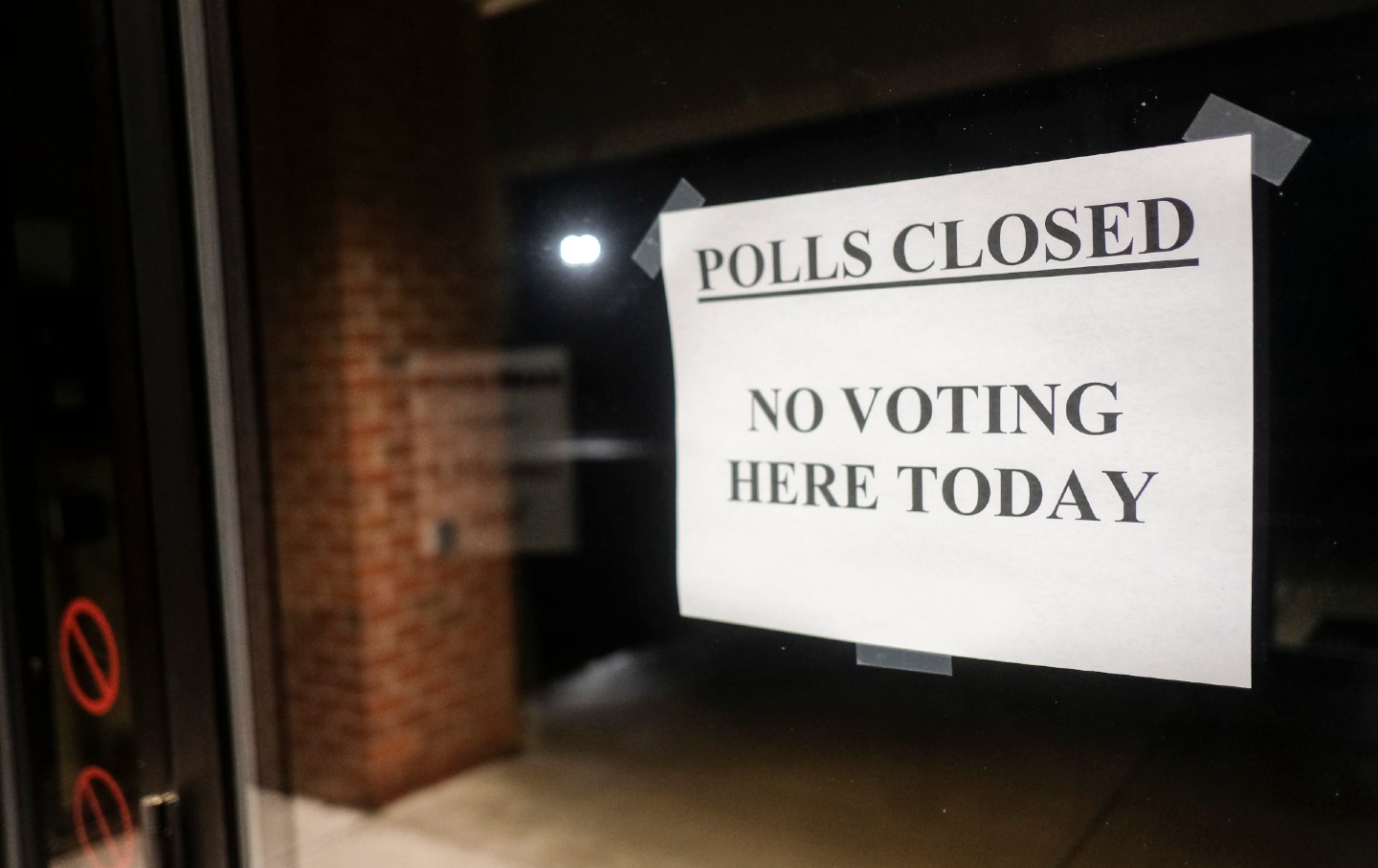 The stock response to President Donald Trump’s suggestion that the general election might be delayed because voting during a pandemic would involve a record number of mail-in ballots, a format he argues is unreliable and susceptible to fraud, is that he doesn’t have that power.
The stock response to President Donald Trump’s suggestion that the general election might be delayed because voting during a pandemic would involve a record number of mail-in ballots, a format he argues is unreliable and susceptible to fraud, is that he doesn’t have that power.
NBC News is typical: “The president has no power to delay an election.” [Emphasis is mine.]
What the president understands, and most mainstream commentators fail to accept, is that it is easier to ask for forgiveness than to get permission. That goes double when the powers in question are limited by a document that lies in tatters, repeatedly ignored.
Liberal politicians and news outlets point out that the Constitution assigns the scheduling of elections exclusively to Congress. Republicans tepidly (and troublingly) stopped short of denying Trump’s power to push back the big day, while insisting that the election ought to take place on time. “Never in the history of this country, through wars, depressions and the Civil War, have we ever not had a federally scheduled election on time. We will find a way to do that again this November 3rd,” Senate Majority Leader Mitch McConnell said.
In an era of rampant cynicism it is sweetly naïve and the amusingly charming to see Americans put so much faith into the constitutional checks and balances they learn about in high school civics class. “‘Trump can’t delay the election,’ experts say,” reads a headline in The Washington Post.
Since when has a 221-year-old piece of paper stopped presidents from doing anything?
I think first of war powers. Article 1, Section 8 of the U.S. Constitution clearly states that the right “to declare war” resides exclusively with Congress. Such key founders as George Washington, James Madison, Thomas Jefferson and Alexander Hamilton—men whose right to define original intent can hardly be questioned—believed that presidents could not dispatch troops without legislative approval except in cases of immediate self-defense. Congress signed off on sending soldiers and sailors to the Quasi-War with France in 1798, naval conflicts with the Barbary States of Tripoli and Algiers, and clashes with Native American tribes in the West.
Congress has since abdicated its war-making powers to the executive branch. Congress hasn’t issued a formal declaration since World War II. Yet we have fought countless wars. Presidents have launched military attacks against Korea, Vietnam, Libya, Grenada, Lebanon, Panama, Serbia, Syria, Iraq and Afghanistan. Some of these wars of aggression were legalistically constructed as “police actions” or “peacekeeping missions” under the aegis of the UN. The fact remains, this is not what the drafters of the Constitution intended. And it has never been amended. Presidents do what they want; lawyers twist logic to justify their illegal slaughters.
President Abraham Lincoln earns democracy points for holding the 1864 election during the Civil War. Yet he suspended habeas corpus and ignored a ruling by the chief justice of the U.S. Supreme Court saying that he didn’t have the power to do so. George W. Bush’s Military Commissions Act of 2006 also suspended habeas, for anyone the U.S. government arbitrarily defined as an “enemy combatant.” Until the Supreme Court ruled against him two years later, Congress was complicit with the MCA. Even after the court ruling, the internment facility at Guantánamo Bay remains open; 40 men remain there, not one of whom has ever been charged or tried under basic constitutional standards.
FDR almost certainly didn’t have the constitutional right to send 127,000 Japanese-Americans to internment camps during World War II. Yet he did.
From domestic surveillance by the NSA that violates the agency’s founding charter to asset forfeiture programs that allow the police to seize money and property from people who have never been charged, much less convicted of a crime, Americans live in a society oppressed by a political class that takes no notice of constitutional limits it deems inconvenient.
Does the president have the legal right to delay an election? No.
Does he have the power? Yes, unless We The People refuse to accept it.
(Ted Rall (Twitter: @tedrall), the political cartoonist, columnist and graphic novelist, is the author of the biography “Political Suicide: The Fight for the Soul of the Democratic Party.” You can support Ted’s hard-hitting political cartoons and columns and see his work first by sponsoring his work on Patreon.)
SYNDICATED COLUMN: Next Memorial Day, Remember America’s Victims Too
Self-Delusion and the Cult of Militarism
Memorial Day: our national celebration of charred meat (but the four contractors hung from that bridge in Iraq don’t count).
Hope you enjoyed the weekend.
However, as we begin the countdown to next year’s Warapalooza—only 362 more days before you fire up the grill or, if someone near and dear died in one of our wars, spend the day at the graveyard grumbling about the fact that too few Americans share your sacrifices—I’d like what’s left of the Left to stop missing a golden opportunity to protest, mock and undermine the cult of militarism.
Let’s make Memorial Day 2013 a day to remember all the victims of American warmongering. By all means, shed a tear for the 58,282 American men and women who died for transnational natural gas corporations during the 1960s and 1970s, and a patently absurd “domino theory” in Vietnam. But make sure you cry 35 times more for the 2,000,000-plus Vietnamese men and women our soldiers were sent to kill—people who posed no threat to us, who did us no harm.
Let’s build a wall for America’s war victims in Washington. It’s the least we could do.
That sucker would be big. Huge. Big enough to stimulate the local construction economy.
Hang a flag and place a flower on the grave of one of the draftees too clueless or afraid to evade service, of a rube so ignorant of history and politics that he enlisted to fight in one of our countless optional wars of illegal aggression, of a bloodthirsty thug who seized the chance to commit murder for the state. They were our brothers and sisters and sons and daughters, and we loved them. We miss their unfinished lives.
Our war dead deserve recognition for helping to expand the American empire, and for lining the pockets of the profiteers and their pet politicians.
But worry not: the right-wingers will never let us forget these heroes.
Those of us who stand on the Left have a different duty. We stand for the oppressed, the downtrodden, the abused. We defend the innocent. We care about the underdog.
We on the Left reject the idea of The Other. To us, no life has more or less meaning or value than any other life. Our dead or not worth more than “their” dead. There is no us and them, there is only us.
Her death is not counted by the Obama Administration; still, we mourn the Yemeni woman blown to bits in a Predator drone strike on her home as much as the young man from North Carolina who goes up in an IED blast in Helmand province.
And so we, the Left, ought to declare that Memorial Day 2013 should belong not just to the jingoists and war criminals and patsies, but also to their victims. We should hang banners and march on behalf of the hundreds of thousands of Iraqis and Afghans murdered by U.S. forces since 2001. Call 1-800-Flowers; ask them to deliver a bouquet to a cemetery in Fallujah.
I’m not a pacifist. Some wars—a few wars—must be fought. Invading armies must be resisted.
But not most wars. War is almost always a struggle of the rich and powerful fought by the poor and powerless. War kills, maims, and makes people crazy. It destroys infrastructure. It sucks away resources—money, technology, people—that would be better deployed somewhere else.
Most Americans know this—or they think they do. On a gut level, however, we’re sheepish and embarrassed about the crimes committed in our name. We’re in denial.
It’s understandable. We’re not insane. We’re in a state of cognitive dissonance; we want to be one thing—peace-loving, good people—but we know we’re the opposite—passive, tolerant and fearful of “our government” (which not only can assassinate any one of us at any time, for any reason, but actually asserts the legal right to do so as consistent with the democratic values to which we supposedly adhere).
“Our” leaders feed us mass delusion. “You came home and sometimes were denigrated, when you should have been celebrated,” President Obama told a group of Vietnam vets on the occasion of the 50th anniversary of the start of the war. “It was a national shame, a disgrace that should have never happened.”
And it didn’t.
As historians have proven, no one ever spat on a soldier returning from Vietnam. To the contrary: the antiwar movement was pro-vet (in part because so many servicemen were conscripts). The spat-on-vet story began circulating after—of all things—Sylvester Stallone’s character in “Rambo 2” talked about it. Obama knows, or should know, the truth. He’s old enough to remember.
“You persevered though some of the most brutal conditions ever faced by Americans in war,” Obama went on. “The suffocating heat. The drenching monsoon rains. An enemy that could come out of nowhere and vanish just as quickly.” Why was the weather so tough, the enemy so fierce? Obama left that, along with much else, unsaid: we were invaders and occupiers, half a world away, propping up tyrants in a place where we had no business whatsoever.
And finally, an outrageous claim, one so widely accepted that the media didn’t bother to quote it in news accounts, much less question it: “We hate war. When we fight, we do so to protect ourselves because it’s necessary.”
What a kidder!
We Americans have fought a handful of battles, much less entire wars, to “protect ourselves.” From the Barbary States to Latin America and Cuba to Grenada and Panama and Pakistan and Somalia and Afghanistan and Iraq, the United States military has attacked without just cause, without legal justification, with impunity, 99 percent of the time.
It’s bad enough to live in a nation in thrall to the cult of militarism. It’s worse to lie about it. And it’s insane to believe the lies.
(Ted Rall’s next book is “The Book of Obama: How We Went From Hope and Change to the Age of Revolt,” out June 5. His website is tedrall.com.)
COPYRIGHT 2012 TED RALL
AL JAZEERA COLUMN: Tied to a Drowning Man
The interconnectedness of the world economy means that US economic woes will have severe effects on others.
During the Tajik Civil War of the late 1990s soldiers loyal to the central government found an ingeniously simple way to conserve bullets while massacring members of the Taliban-trained opposition movement. They tied their victims together with rope and chucked them into the Pyanj, the river that marks the border with Afghanistan. “As long as one of them couldn’t swim,” explained a survivor of that forgotten hangover of the Soviet collapse as he walked me to one of the promontories used for this act of genocide, “they all died.”
Such is the state of today’s integrated global economy.
Interdependence, liberal economists believe, furthers peace—a sort of economic mutual assured destruction. If China or the United States were to attack the other, the attacker would suffer grave consequences. But as the U.S. economy deteriorates from the Lost Decade of the 2000s through the post-2008 meltdown into what is increasingly looking like Marx’s classic crisis of late-stage capitalism, internationalization looks more like a suicide pact.
Like those Tajiks whose fates were linked by tightly-tied lengths of cheap rope, Europe, China and most of the rest of the world are bound to the United States—a nation that seems both unable to swim and unwilling to learn.
The collapse of the Soviet Union, a process that began in the 1970s and culminated with dissolution in 1991, had wide-ranging international implications. Russia became a mafia-run narco-state; millions perished of famine. Weakened Russian control of Central Asia, especially Afghanistan, set the stage for an emboldened and highly organized radical Islamist movement. Not least, it left the United States as the world’s last remaining superpower.
From an economic perspective, however, the effects were basically neutral. Coupled with its reliance on state-owned manufacturing industries to minimize dependence upon foreign trade, the USSR’s use of a closed currency ensured that other countries were not significantly impacted when the ruble went into a tailspin.
Partly due to its wild deficit spending on the gigantic military infrastructure it claimed was necessary to fight the Cold War—and then, after brief talk of a “peace dividend” during the 1990s, even more profligacy on the Global War on Terror—now the United States is, like the Soviet Union before it, staring down the barrel of economic apocalypse.

